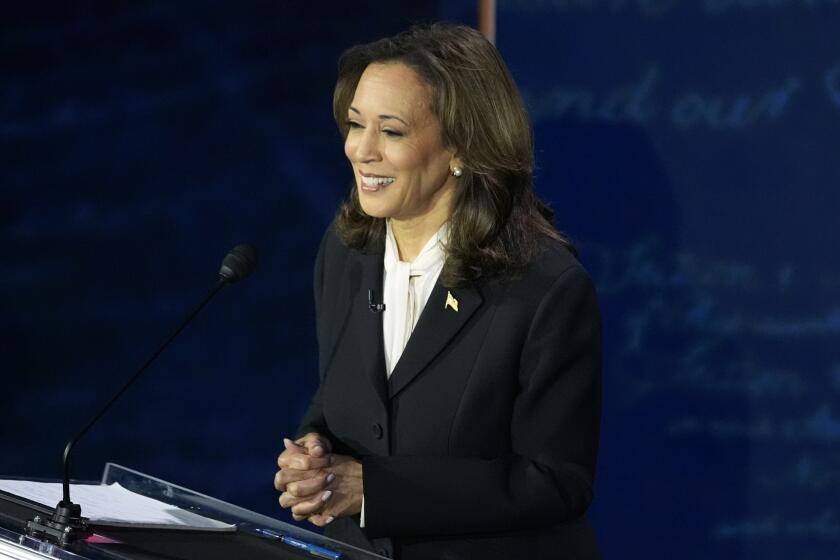How can millions of voters still be undecided between Trump and Harris? Here are their reasons

- Share via
WASHINGTON — In a U.S. presidential race that features a deeply polarized electorate and a sharp contrast between the two candidates, most voters have known for months which side they are on.
Then there are people like Faith.
A middle-aged manager of a substance abuse treatment center in southern Pennsylvania, she voted for Donald Trump in 2016 and Joe Biden in 2020.
This year she is among millions of voters in swing states who are still wrestling over which way to vote — or whether to vote at all. They are likely to decide the outcome.
A shift of 2 or 3 points in the Democrat’s direction once all the latest polling is accounted for would be a significant gain.
In a focus group of swing voters, Faith said she disliked Trump for the reasons she turned against him four years ago — “the bullying and the arrogance” — but that she wasn’t sure what she thought about Kamala Harris.
Harris “says all the right things, but I need to know a little bit more about who she is,” said Faith, who, like others in the focus groups I observed last week, participated on the condition that her last name not be disclosed. “She talked about an ‘opportunity economy.’ I want to know what that means.”
The precise number of voters still up for grabs is hard to pin down, because most polls don’t offer “undecided” as an option. But pollsters estimate it’s between 5% and 10% of the electorate.
That stubborn minority is more than enough voters to determine the outcome of an election that could be decided by razor-thin margins in seven swing states.
Who are these indecisive people who find it hard to choose between vividly different candidate?
They fall into several categories.
Peggy Hayes has been through a lot since Donald Trump first won office, and her views of him have evolved. She remains a supporter, albeit a less zealous one.
Some, but not all, are “low-information voters,” people who are only now tuning into the campaign.
“A lot of them are people who don’t follow politics closely, or at all,” said Whit Ayres, a Republican pollster. “They only get around to thinking about politics when they have to make a decision on who they will vote for — if they vote at all.”
Others are so-called double haters — voters who dislike both candidates. As many as 15% of the electorate fell into this category in polls last month, although that number is probably shrinking.
“They are people who do pay attention to politics and don’t like what they see,” Ayres said.
In 2016, they were a decisive factor in swinging the election to Trump; in 2020, they helped swing it back to Biden.
Still others are independents, focused mostly on economic issues.
“They’re looking for the answer to their question: What are you going to do to get the country on a better track in terms of the economy?” said GOP pollster David Winston.
And a few, like Faith in Pennsylvania, are moderate Republicans who don’t like Trump but still hesitate to vote for a Democrat like Harris who has sometimes veered toward her party’s progressive wing.
“There’s a part of me that longs for Dick Cheney, Mitt Romney, John McCain,” Faith said.
I sat in on three focus groups, all drawn from voters who had supported Trump in 2016 and Biden in 2020. Two of the groups were assembled by Engagious, a public opinion consulting firm, for the media organization Axios. The third was put together by the GOP dissident group Republican Voters Against Trump; the participants were not members.
In over-the-top attacks, Donald Trump calls Vice President Kamala Harris a communist, sometimes even a fascist. Why his wild swings aren’t connecting.
Most of the 20 swing voters weren’t entirely undecided, but almost all said they needed more information — especially about Harris — before they make up their minds.
“I do not want Trump back in office,” said Jennifer, who works for a nonprofit in Wisconsin. But “with Harris, I just don’t feel as if I know enough about her .. and what she stands for.”
Bryan, 39, who lives in Atlanta’s western exurbs, said he initially leaned toward Trump, but Harris’s strong performance in last week’s debate gave him second thoughts. He still wants to hear more about Harris’s economic plans.
“I think she needs more well-defined policy,” he said. “I feel like she’s been vague.”
The economy “was better under Trump,” he said, but the Republican candidate “needs to act presidential and come in with facts that aren’t lies.”
Rich Thau of Engagious said he has noticed several patterns in the dozens of similar focus groups he has convened.
“It’s a contest between someone they don’t like and someone they don’t know,” he said. “There’s a huge lack of awareness on Harris’ economic plan, a huge fill-in-the-blank that she is just starting to fill.
“Voters who are struggling in this economy often remember the Trump years fondly,” he said. “They think he can do the job on the economy better, but they can’t stand the guy. So for them, this choice is a 50-50 proposition.”
The lessons for the candidates, at least from these voters, are clear.
To appeal to undecideds, Trump needs to tone down his rhetoric, stop spreading myths about migrants eating dogs and cats, and reinforce his economic credentials. Instead, he appears to be leaning deeper into falsehoods and conspiracy theories.
And Harris needs to talk in more detail about her economic plans. The good news for her is that those undecided voters are listening — and many are looking for a reason to move in her direction.
More to Read
Get the L.A. Times Politics newsletter
Deeply reported insights into legislation, politics and policy from Sacramento, Washington and beyond. In your inbox twice per week.
You may occasionally receive promotional content from the Los Angeles Times.













